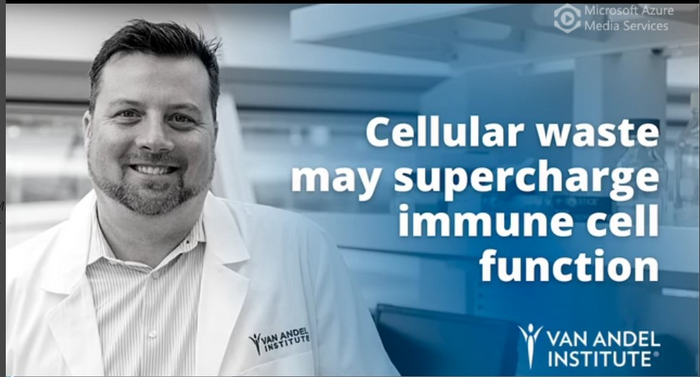GRAND RAPIDS, Mich. (August 17, 2022) — The immune cells that protect us from infection and cancer seek out a wide array of fuel sources to power their function — including some long thought to be cellular waste products.

Credit: Courtesy of Van Andel Institute
GRAND RAPIDS, Mich. (August 17, 2022) — The immune cells that protect us from infection and cancer seek out a wide array of fuel sources to power their function — including some long thought to be cellular waste products.
The findings, published today in Cell Metabolism, lay the foundation for future personalized dietary recommendations designed to supercharge the immune system and augment therapies for cancer and other diseases.
“Every process in the body is powered by metabolism, which in turn is fueled by the nutrients we consume through our diet,” said Russell Jones, Ph.D., chair of Van Andel Institute’s Department of Metabolism and Nutritional Programming and senior author of the study. “We found that immune cells are much more flexible in selecting the nutrient fuels they consume and, importantly, that they prefer some nutrients that were previously dismissed as waste. This understanding is crucial for optimizing T cell responses and developing new strategies for boosting our ability to fight off disease.”
T cells are the soldiers of the immune system and are tasked with combating bacteria, viruses and even cancer cells. They absorb nutrients from the foods we eat to generate the energy required to carry out their jobs.
The findings stem from a novel approach that could reshape how metabolism is studied. Historically, T cells are grown in the lab in dishes of nutrient-containing media. However, much of this media doesn’t fully reflect the rich array of nutrients found in the human body. To solve the problem, Jones and his colleagues developed media packed with a more diverse range of nutrients.
“Previously, we were giving immune cells a very basic diet — the equivalent of just eggs and toast,” Jones said. “We found that, when we offer them a full buffet, these cells actually prefer a wider array of ‘fuels’ than previously believed. This has major implications for how we tailor dietary recommendations as ways to promote health and combat disease.”
One example is lactate, a cellular waste product responsible for muscle aches after a long workout. When presented with glucose, a common sugar found in the body and in lab media, and lactate, the T cells preferentially used the lactate to power energy production — a decision that enhanced their function.
Lactate also is an important byproduct of cancer cells and facilitates cancer’s ability to invade other tissues and evade attack by the immune system. Some research suggests that too much lactate may be bad for T cells. The work from Jones’ group indicates that, at lower levels, lactate may actually enhance T cell function.
The findings also suggest that T cell function and survival is strongly influenced by the nutrients available in their environment. Going forward, Jones and his colleagues aim to delve deeper into the intricate relationships between metabolism and the immune system in search of new insights to further illuminate how these crucial systems collaborate.
Authors include Irem Kaymak, Ph.D., Katarzyna M. Luda, Ph.D., Lauren R. Duimstra, Eric H. Ma, Ph.D., Joseph Longo, Ph.D., Michael S. Dahabieh, Ph.D., Brandon M. Oswald, McLane J. Watson, Ph.D., Susan M. Kitchen-Goosen, Lisa M. DeCamp, Shelby E. Compton, Zhen Fu, Ph.D., Kelsey S. Williams, Ph.D., and Ryan D. Sheldon, Ph.D., of VAI; Brandon Faubert, Ph.D., of University of Chicago; and Ralph J. DeBerardinis, Ph.D., of UT Southwestern Medical Center.
Research reported in this publication was supported by Van Andel Institute (Jones), and an Allen Distinguished Investigator Award, a Paul G. Allen Frontiers Group advised grant of the Paul G. Allen Family Foundation (Jones).
Jones is supported by the National Institute of Allergy and Infectious Diseases of the National Institutes of Health under award no. R01AI165722. Support for authors on this project include a postdoctoral fellowship award from Fonds de la Recherche du Québec–Santé (FRQS) (Dahabieh); a VAI Metabolism and Nutrition (MeNu) Program Pathway-to-Independence Award (Longo); National Cancer Institute award no. T32CA251066-01A1) (Watson) and award no. R35CA2202901 (DeBerardinis); and the Howard Hughes Medical Institute Investigator Program (DeBerardinis).
The content is solely the responsibility of the authors and does not necessarily represent the official views of granting organizations.
###
ABOUT VAN ANDEL INSTITUTE
Van Andel Institute (VAI) is committed to improving the health and enhancing the lives of current and future generations through cutting-edge biomedical research and innovative educational offerings. Established in Grand Rapids, Michigan, in 1996 by the Van Andel family, VAI is now home to nearly 500 scientists, educators and support staff, who work with a growing number of national and international collaborators to foster discovery. The Institute’s scientists study the origins of cancer, Parkinson’s and other diseases and translate their findings into breakthrough prevention and treatment strategies. Our educators develop inquiry-based approaches for K-12 education to help students and teachers prepare the next generation of problem-solvers, while our Graduate School offers a rigorous, research-intensive Ph.D. program in molecular and cellular biology. Learn more at vai.org.
Journal
Cell Metabolism
DOI
10.1016/j.cmet.2022.07.012
Article Title
Carbon source availability drives nutrient utilization in CD8+ T cells
Article Publication Date
17-Aug-2022




